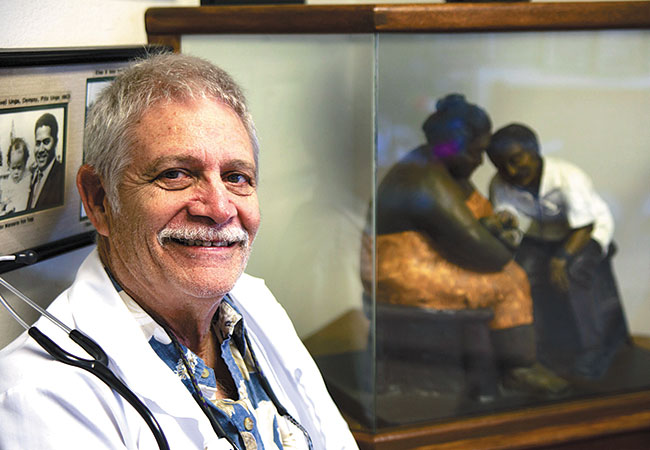The Country Doctor Of Ko’olauloa
The 1909 film Country Doctor was a tear-jerker in which a small-town American physician was torn between staying bedside with his gravely ill daughter and helping others who equally needed his services.
That brings me to the story of Marc Shlachter, M.D., self-styled “Country Doctor” of Hauula and Laie. Very small-town American doctor.
He’s from Cleveland (where I was born and lived through age 7), and if you’re curious how he came here, it’s pretty simple:
“From watching the 1961 movie Gidget Goes Hawaiian at a high school graduation party.”

‘Country Doctor’ Marc Shlachter | Photo courtesy Dr. Marc Shlachter
I’ve known the doc since he came to Hauula 43 years ago and I lived in Punaluu, when he had to dump the usual doctor’s exam table and use a butcher’s block to handle his weighty, mostly Polynesian patients. When he got paid in taro, fish, chickens and cooked food. Was inaugurated as a Samoan chief. When he married a local Filipina and raised two children, divorced, married again to a woman from Japan, who now manages his office and his money – the latter being what he’s worst at.
Wherever you go with him in Hauula-Laie, people shout, “Hey, Dr. Shlachter!” The Chinese restaurant in Laie Shopping Center carries a vegetarian “Dr. Shlachter Special.”
I was curious what the Country Doctor, who was featured on MidWeek‘s cover back in 1994, thinks about Obamacare and the limits on Medicare reimbursements. And what does this physician with so many patients who will never access HealthCare.gov on the Internet think of the state of our health care system?
“The premise that every American should have health coverage should be a right,” Shlachter says. “The changes that already exist are very good, such as a child staying under the parents’ plan through age 26. And that physical exams and wellness checks are a covered service.
“I believe the country would be much better off with a universal payer like Medicare for everyone, with the federal government or the state contributing to the premiums for indigents. Having multiple insurance companies competing with each other drives up the cost – for example, the five Quest insurers here for indigents.
“The argument that mandatory health care insurance is a form of communism is hogwash. No one says mandatory auto insurance for all drivers is communism. I believe non-competitive health insurance with (one payer) would save the country much money that can be used for other things.”
Shlachter says he didn’t end up making much money out there in Hauula and Laie, and his home phone rings at all odd hours – just like the doctors’ home phones of old days.
But there in “the country” he’s an icon and a family friend, not just a health provider.
And in 43 years, there haven’t been many illnesses, diseases or injuries he’s not seen, diagnosed and treated.
That – rather than the money – used to be what drew our young people into the medical profession.





